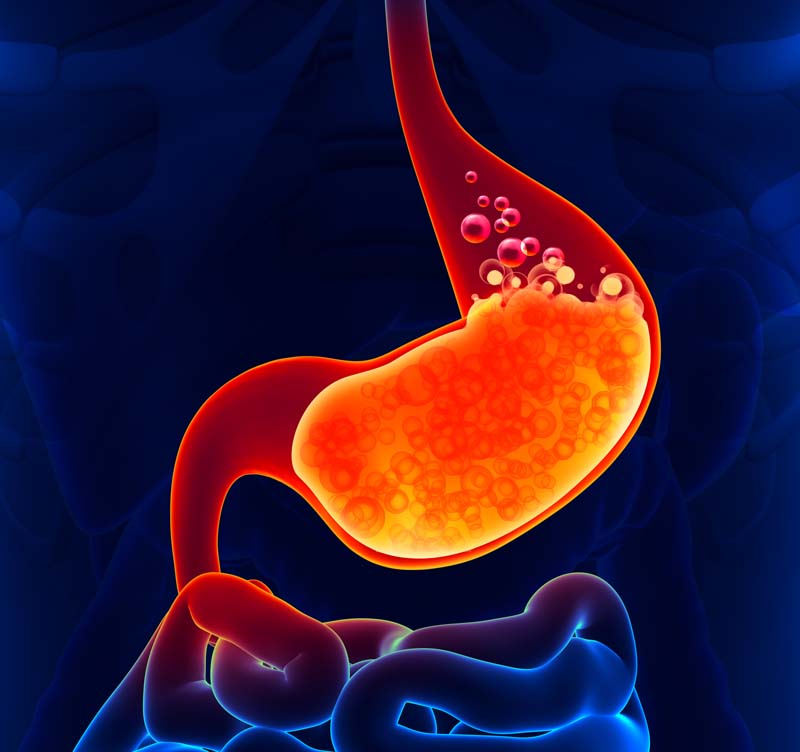
What is Hypochlorhydria?
Hypochlorhydria means that you have low stomach acid. In many cases, this can cause you to suffer from poor digestion of various foods. If certain foods are unable to properly get digested, they can find their way into the bloodstream. This is known as “leaky gut” and you can find more information on this condition here. There are numerous issues that arise as a result of hypochlorhydria but the main problem is a weak intestinal function.
What does stomach acid do?
Hydrochloric acid is responsible for the breakdown of protein by activating an enzyme called pepsin, which ultimately breaks down protein[1]. If you are unable to digest beef, pork, or chicken, it is possible that the gastric acid in your stomach is too low for proper digestion. The undigested proteins have to go somewhere. Therefore, as the protein molecules escape into the blood stream due to the weak inner walls of your intestinal tract, your body thinks the escaping protein is a sign of an infection and attempts to attack and destroy it. As a result, increased inflammation causes additional damage to your intestinal tract. Over time, this could result in leaky gut and an increase in autoimmune diseases.
Try these steps if you think you suffer from low stomach acid
- Observe your stool over a period of a week as you vary your diet.
- To the extent the stool is loose, oily, with a lighter color, it could be a sign that your food is not being properly digested.
- If, on the other hand, your stool is darker brown and tends to be more solid, as you vary your diet, then it is usually indicative of a properly functioning digestive system.
- Assuming that your stool is the former, then, in consultation with your health practitioner, take one Betaine HCL with Pepsin supplement during each meal. To the extent that you feel no reaction, take two tablets with each meal the following day. Continue doing this step-wise until you feel a burning sensation in your stomach and/or you experience heartburn. Then, reduce your intake by one tablet and stay there until the symptoms reappear. For further reading, this article on livestrong.com goes through the necessary steps.
If you continue increasing your dose using the challenge test as directed above, chances are high that you have hypochlorhydria, or low stomach acid, which could be the reason for your migraines. In short this is what happens:
- Low stomach acid causes your body not to absorb certain proteins or other foods;
- The body thinks it is fighting a bacterial infection or virus;
- The brain signals that there is something seriously wrong via an acute migraine;
- You think you are allergic to the food, removing this food from your diet, and thereby removing potentially important nutrients in the process;
- Over time, the intestinal tract gets weaker and sicker, leading to more severe leaky gut which continues the cycle.
Some interesting statistics about hypochlorhydria: [2]
- 15% of the entire American population has Hypochlorhydria
- 40% of 40 year olds have Hypochlorhydria
- 50% of 60 year olds have Hypochlorhydria
- Over 30 percent of the over-60 crowd suffers from something called Atrophic Gastritis, a condition characterized by Achlorhydria (zero stomach acid)
- 40% of women over the age of 80 have Achlorhydria
[1] “Hypochlorhydria (Low Stomach Acid)”, http://www.ndhealthfacts.org/wiki/Hypochlorhydria_(Low_Stomach_Acid)
[1] “H. PYLORI — TOO MUCH STOMACH ACID OR TOO LITTLE”, http://www.doctorschierling.com/blog/h-pylori-too-much-stomach-acid-or-too-little

I thought there was a connection between low stomach acid and migraines. I have suffered from both complicated migraines and gastritis since I was a child. There are different migraine triggers for me like fluorescent lights, sunlight, and lack of sleep. The past three weeks I’ve had horrible gastritis, unable to eat, along with migraines with auras. I recently learned gastritis is due to low stomach acid. Right before this last episode I was eating raw broccoli, along with lentil soup and brussle sprouts. All difficult foods to break down.
I also learned blood type A people have low stomach acid, in which I am. It all makes sense. Thanks for sharing your story and helpful information!
Celery juice is said to help restore stomach acid. It is best taken at the start of the day.
Thanks for sharing – that is a good point. You can also drink a glass of water with lemon and apple cider vinegar, as soon as you wake up, in order to jump-start the digestive process.